The
Home Page Selection
If
you require further information on any
print featured here, please contact
us.
When
a print has been sold it will be marked
as Sold.
A
growing archive of selections
from previous Home pages is featured in
the
Home
Page Selection Archive |
|
See
also :
Click
on a thumbnail (left)
to link directly with the entry for that
print, or scroll down to view all the selected
prints from the current Home
Page.
Images
are not to relative scale (see stated dimensions) and also at only modest resolution.
If you wish to view extracts of an image at higher resolution, please Contact us.
|
|
|
|
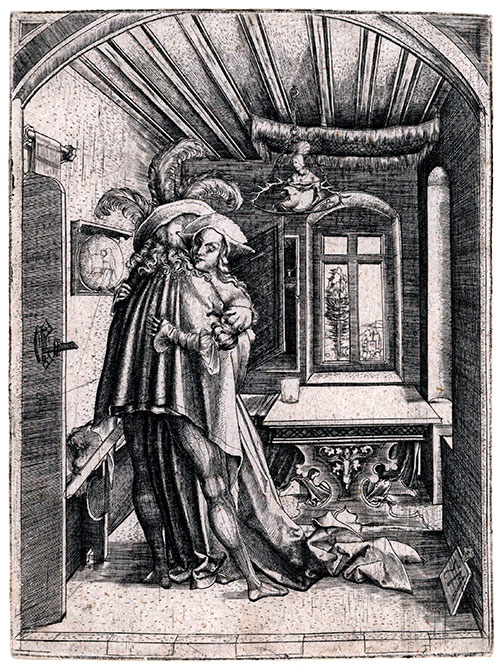
| |
The Master MZ
c1477 – c1555
Nothing is known of the Master MZ beyond his monogram on the twenty-two independent engravings which he produced for a few years around 1500.
The 17th century suggestion that he was the goldsmith Martin Zaisinger, active in Munich 1498-1555 as a printer and goldsmith, is generally dismissed, though such engravings as The Ball and The Tournament in their architectural detail indicate an incidental geographical connection to the Munich court of Albert IV, Duke of Bavaria.
His six dated prints are variously from 1500, 1501 and 1503, though only one print, The Embrace, is dated 1503, so it has been surmised this may have been his final print; and that he took up printmaking only briefly when Dürer’s prints had created a new interest and market.
Most of his prints, which include both sacred and secular subjects, have detailed backgrounds, whether landscapes or interiors and show an innovative interest in light coming from different sources. They also look back to the late Gothic and employ idiosyncratic perspective schemes.
The Embrace
Illustrated Bartsch 16; Lehrs 16
158 x 117 mm
Original engraving, 1503.
The plate signed with the monogram on the tablet and dated above the glass in the window enclosure in the back wall.
On unwatermarked laid paper, trimmed to the plate.
A good but slightly later impression.
Sold
Ex collection:
- The Earl of Northwick (Lugt 2709a) and by successive descent to his grandson
- Edward George Spencer-Churchill (sold at auction in Leipzig)
- Dr James Henry Lockhart (Lugt 4387)
An enigmatic plate, with the meaning left open to the viewer’s imagination. Return to top ^ |
|
|
|
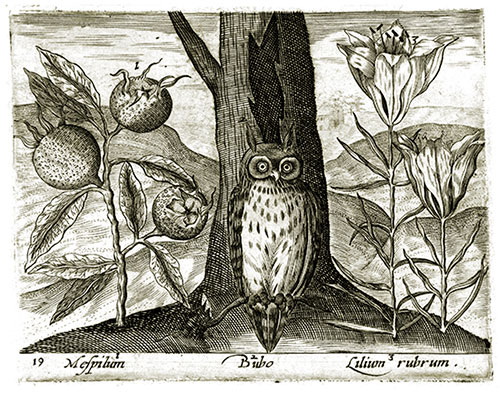
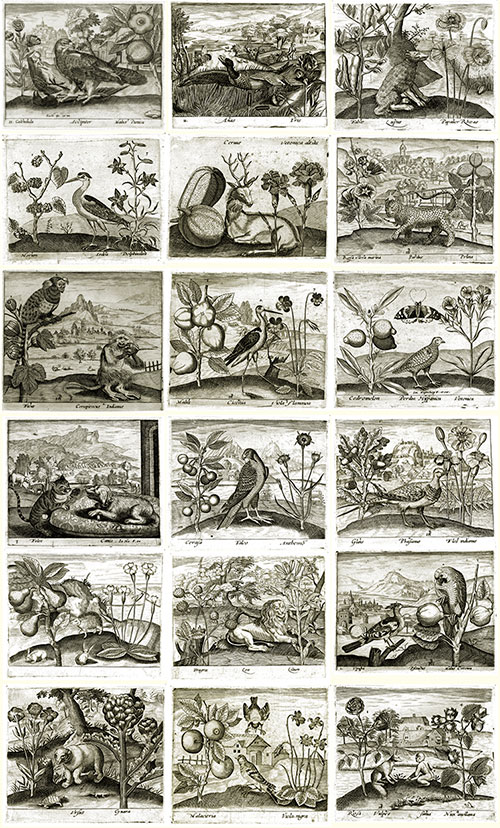
|
|
JOHANN HOGENBURG
Born c1550. Active 1594 – 1614
One of the two engraver sons of Frans Hogenberg, famous for his atlas, Johann was principally a portrait engraver in Mechelen and Cologne but also produced a few religious subjects and a delightful series of at least nineteen animals, birds and plants, some set in detailed landscapes full of incident.
Hollstein lists, without specifying, Various Birds and Animals (Holl. 43-54); the Rijks Museum have all those, plus an additional five plates related to the series; and as offered here, the series is further enlarged by two plates respectively of a Stork and a Falcon.
Variously, either in combination or uniquely, ten have Hogenberg’s name or monogram (Nagler monogram 730); two also name Hogenberg as publisher; five have plate numbers (2?, 3, 11, 13 and 19); while eleven are on paper with a Crescent Moon with the profile of a face watermark (cf Briquet 5338, dating the paper to 1589-97).
The Rijks Museum website describes the series
“In making his representations of flowers and animals Hogenberg borrowed freely from prints
by other artists. Some combinations are endearing, others slightly bizarre. What does a polar bear
have to do with artichokes ? It is precisely the series’ mixture of originality and naiveté that is so
appealing to modern eyes.”
(Several of the flowers, fruits and plants have close similarities to Crispin de Passe the Elder’s first edition of his Florilegium, produced in Cologne at about the same time, c1600-1604.)
Medlar, Owl, Lily
from
a ‘complete? set’ of the series of Plants, Animals, and Birds in Landscapes
Hollstein
43-54 and seven more ex Hollstein
Tallest sheet size 111 mm; widest sheet size 136 mm
Nineteen engravings, presumably all engraved and published by Johann Hogenberg or his workshop, c1600-05.
Watermark where identifiable, Crescent moon with a face.
Trimmed to thread margins.
The set £12500
Comprising:
Cedro Melon, Spanish Partridge, Veronica. Signed and published by Johann Hogenberg, Crescent Moon with Face watermark
Hoopoe, Parrot, Malus corona (apple). Signed with the monogram. Crescent Moon with Face watermark
Cat, Dog, Elephant and Rhinoceros. Signed and published by Hogenberg, plate 3
Oak, Pheasant, Chrysanthemum. Signed with the monogram. Crescent Moon with Face watermark
Fig, Monkeys, Cattle. Signed with the monogram. Crescent Moon with Face watermark
Apple, Stork, Pansy. Signed with the monogram. Crescent Moon with Face watermark
Orange tree, Finch? Violet. Crescent Moon with Face watermark
Duck, Iris. Signed with the monogram. Plate 11. Crescent Moon with Face watermark
Strawberry, Lion, Lily
Marigold, Hawk, Pomegranate tree. Signed and published by Hogenberg. Plate 13
Cherry tree, Falcon, Anthemo ? Crescent Moon with Face watermark
Marrow, Melon, Stag, Carnation. Crescent Moon with Face watermark
Pear, Rabbits, Boar, Primroses. Crescent Moon with Face watermark
Rose, Fox, Monkey, Hazelnut tree. Signed with the monogram
Hollyhocks, Leopard, Plum tree? Signed with the monogram
Blackberry, Heron, Siberian Larkspur.
Bean, Wolf, Poppy,
Medlar, Owl, Lily. Plate 19. Crescent Moon with Face watermark
Tortoise, Bear, Lizard, Artichoke.
Return to top ^ |
|
|
|
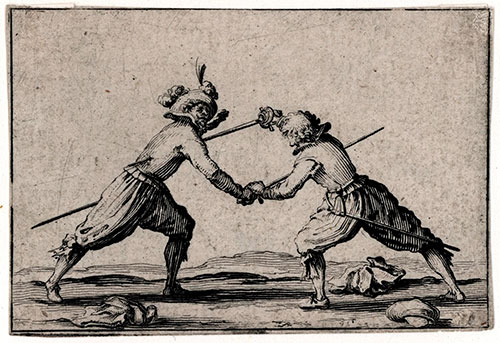 |
|
JACQUES CALLOT
Nancy 1592 – 1635 Nancy
Callot went to Rome at the age of sixteen, as an apprentice to the engraver and print dealer Philippe Thomassin. After three years he moved to Florence. There, from 1611, he was employed by Cosimo de’ Medici, until the death of his patron, when Callot returned to his native Lorrain in 1621.
His etchings, all from his own designs, range from the miniature, as with The Dual, to the monumental, and cover a wide range of subjects.
Callot devised a system of etching in imitation of the swelling and tapering lines of the Mannerist engravers. The first etchings in which he used this technique were the novel series of fifty Capricci, published in 1617, which mirror Florentine life. The finesse of these etchings has suggested that Callot worked with a double magnifying glass. They were his first great success. Dedicated to the seventeen old year old Prince Lorenzo de’ Medici, whose older brother, Callot’s patron, was so pleased with the series that he paid the etcher a large bonus.
Dual, with man run through
Lieure 240
54 x 80 mm (sheet)
Original etching, 1617, one of the Capricci.
A very fine impression from the original, Florentine, version of the series.
Laid paper without watermark, trimmed to or just into the plate, the borderline showing all round.
£450
The original plates of the Florentine Capricci were presumably left behind when Callot returned to Lorrain in 1621, for he re-etched a second version of close copies in Nancy, 1621-22.
Return
to top ^ |
|
|
|
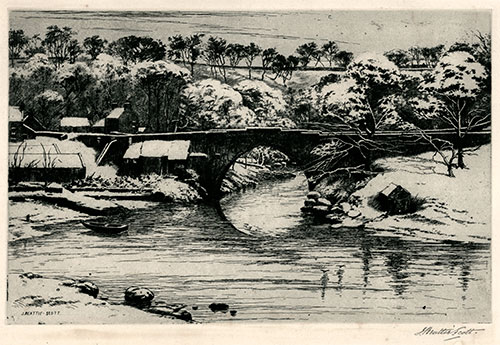 |
|
JOHN BEATTIE SCOTT
Old Machar, Aberdeen 1866 – post 1939 London
An Aberdeen landscape artist, Scott exhibited between 1891 and 1917.
Scott used very skilful wiping of the plate to create tone in the sky and contrasting white highlights, snow effects and moonlight or lamplight.
(Winter Landscape) A river Don bridge near Aberdeen ?
212 x 325 mm
Original etching, the plate signed.
Signed in pencil.
Printed in blue-black ink on cream wove paper.
£250
Return
to top ^ |
|
|
|
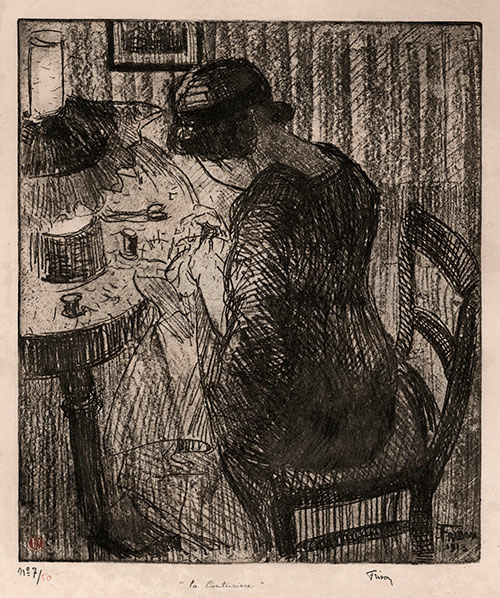 |
|
JEHAN FRISON
Brussels 1888 – 1961 Linkebeek
A post-Impressionist painter and printmaker, Frison attended the Academy of Sint-Joost-ten-Node from the age of twelve, going on to the Brussels Academie Royale, 1896-1902.
In his early career he travelled to London and Paris and at home exhibited in Belgium with La Libre Esthétique.
He settled in Linkebeek in 1913.
La Coutourière  The Seamstress The Seamstress
344 x 293 mm
Original soft-ground etching, 1913.
The plate signed and dated.
Signed in pencil, numbered (No.7 of the edition of 50) and entitled.
Also with the artist’s red monogram stamp.
Printed in brown-black ink on cream wove.
Sold
Return
to top ^ |
|
|
|
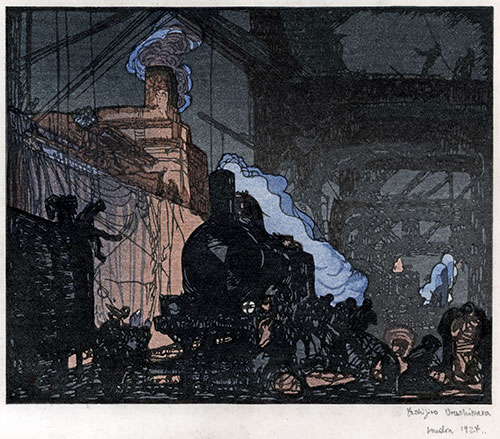 |
|
JOSHIJIRO URUSHIBARA
Shiba, Tokyo 1889 – 1953 Tokyo
Urushibara came to London in 1910, on behalf of his employer, the firm of the Shimbi Shoin, to demonstrate Japanese woodblock printing at the Japan-British Exhibition held that year at White City, Shepherds Bush, May-October.
He went on to work at the British Museum first to reproduce a famous Chinese hand scroll and in restoring and mounting prints. At the B.M. he became friendly with Laurence Binyon and got to know several British artists, Clausen, Brangwyn &co, collaborating with them, interpreting their paintings into colour woodcuts. He also made his own original prints.
Urushibara remained in London till 1940, when he and his family were forced to leave and return to Japan.
In the Docks (Station)
Chapman & Horner UB37
173 x 213 mm
Colour woodcut after a watercolour by Frank Brangwyn.
Signed in pencil by Urushibara and dated London 1924.
Plate 8 in the portfolio Ten Woodcuts by Joshijiro Urushibara, published by John Lane 1924.
All ten woodcuts were after Brangwyn.
Edition of 250.
On japan.
£250
Exhibited 1928
Return
to top ^ |
|
|
|
|
|
|
|